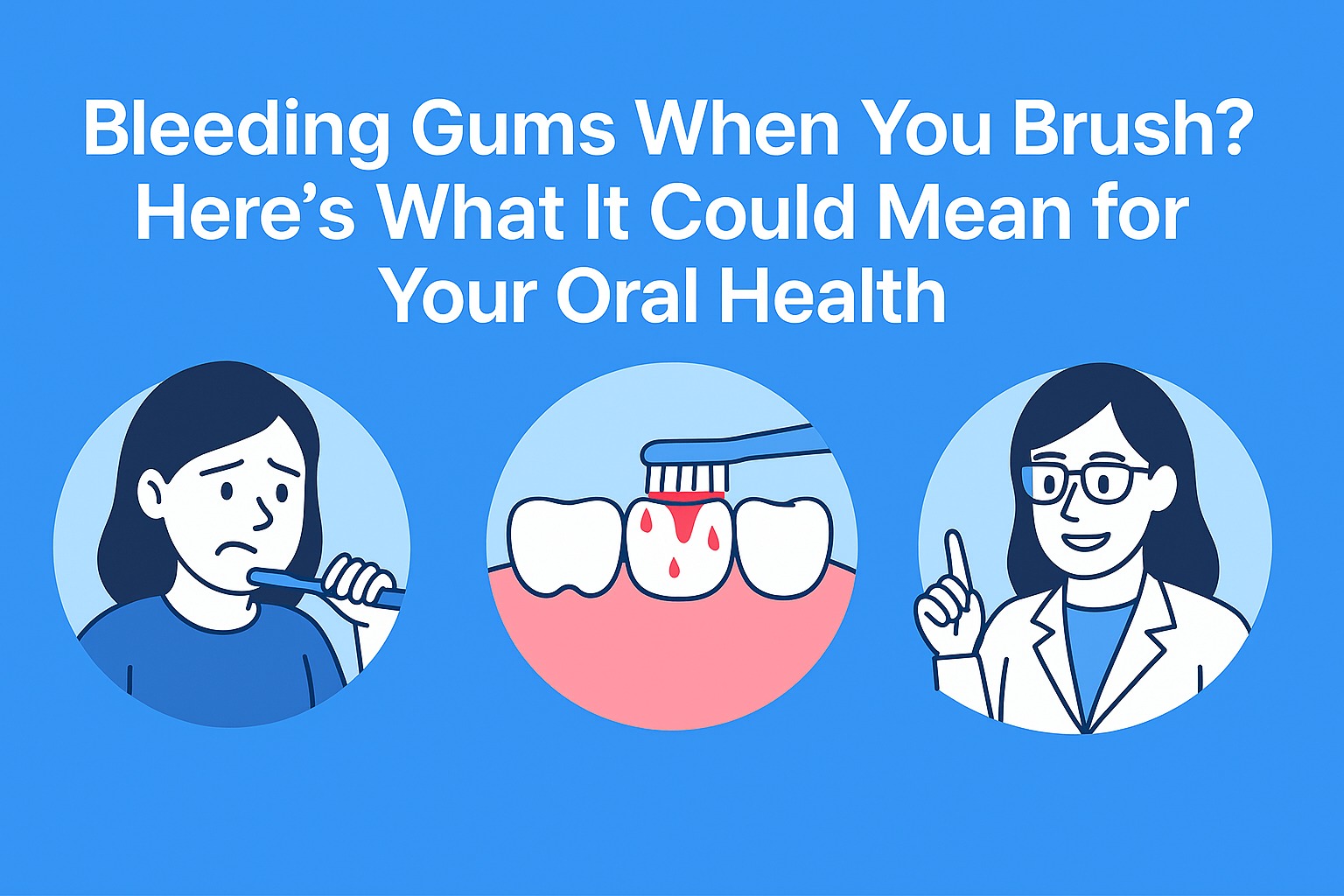Bleeding Gums When You Brush? Here's What It Could Mean for Your Oral Health
- Home
- Blog
- Oral Health
- Oral Health
- Comments
Bleeding Gums When You Brush? Here's What It Could Mean for Your Oral Health
Have you ever noticed a bit of pink in the sink after brushing your teeth? While many dismiss it as harmless, bleeding gums are often your body's early warning signal that something is wrong. And the sooner you act, the easier it is to reverse the damage and avoid long-term complications.
Your Body's Early Warning System
Bleeding gums aren't just about poor brushing — they may be telling you about gum disease, nutritional deficiencies, hormonal changes, or even systemic health issues like diabetes. Ignoring this sign can lead to serious consequences like gum recession, loose teeth, or chronic infections.
What Causes Gums to Bleed? Let's Break It Down
Understanding the root cause of bleeding gums is crucial for effective treatment. Here are the most common causes:
✅ Common Causes of Bleeding Gums
Gingivitis (Early Gum Disease): Caused by plaque buildup at the gumline. If untreated, it progresses silently into periodontitis — a more aggressive form of gum disease.
Brushing Too Hard: Using a hard-bristle toothbrush or scrubbing with too much pressure can damage delicate gum tissue.
Flossing Irregularly or Incorrectly: If you suddenly start flossing after a long gap, bleeding may occur temporarily — but persistent bleeding is not normal.
Vitamin Deficiencies: Lack of Vitamin C weakens blood vessels in the gums, making them prone to bleeding. Vitamin K deficiency can affect clotting.
Hormonal Changes: Puberty, pregnancy, menstruation, or menopause can increase gum sensitivity and inflammation.
Medical Conditions: Diabetes, leukemia, or blood thinning medications can cause spontaneous gum bleeding.
Smoking: Reduces blood flow to the gums, weakening your immune response and masking early symptoms of disease.
The Progression of Gum Disease
Gingivitis → Periodontitis → Advanced Periodontitis → Tooth Loss
Early intervention can stop this progression and save your teeth.
How We Diagnose and Treat Bleeding Gums at Dentinix
At Dentinix, we don't wait for gum issues to escalate. During your dental visit, we perform a comprehensive gum health check, measuring pocket depths, checking inflammation, and reviewing your hygiene routine. Based on the diagnosis, we customize your care plan, which may include:
✅ Our Comprehensive Treatment Approach
Professional Scaling and Root Planing: To remove plaque and tartar from above and below the gumline
Antimicrobial Rinse & Irrigation: Targeting infection-causing bacteria
Customized Home Care Plan: Including brushing technique coaching, flossing guidance, and dietary advice
Laser-Assisted Gum Therapy (if required): For advanced cases of periodontal disease
Prevention Strategies for Healthy Gums
Dentinix Pro Tip: Prevention Is Always Easier Than Cure
Most cases of gum bleeding can be reversed with early intervention. But once gum disease advances, treatment becomes more complex — involving bone support, gum grafts, and even surgical cleanings.
That's why at Dentinix, we focus on preventive care. Our hygienists don't just clean your teeth — they coach you on maintaining gum health for life. We also use high-quality diagnostic tools to monitor changes between visits.
When to Seek Professional Help
Warning Signs That Require Immediate Attention
Persistent Bleeding: Gums that bleed every time you brush or floss
Swollen or Tender Gums: Pain or discomfort in gum tissue
Bad Breath: Persistent halitosis that doesn't improve with hygiene
Loose Teeth: Teeth that feel wobbly or have changed position
Receding Gums: Gums that appear to be pulling away from teeth
Pus Between Teeth: Any discharge or abscess formation
Final Word: Your Gums Speak — Are You Listening?
Healthy gums don't bleed. If yours do, don't ignore the signs or rely on DIY mouthwashes. Let a dental expert assess the cause and guide you with evidence-based treatment.
At Dentinix, we believe in empowering patients with knowledge about their oral health. Bleeding gums are not just a cosmetic concern — they're a health indicator that deserves attention. Our team is committed to helping you understand what your gums are telling you and providing the care you need to restore and maintain optimal oral health.
Don't wait for small problems to become big ones. Contact Dentinix today to schedule a comprehensive gum health assessment and take the first step toward healthier, stronger gums.

